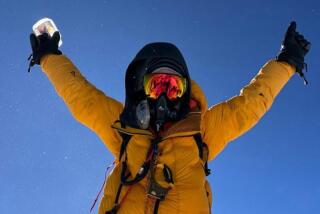Charles Warren; Doctor Tried to Climb Everest
- Share via
Charles Warren, who joined three unsuccessful attempts to climb Mt. Everest in the 1930s, including the last British assault on the mountain before the start of World War II, has died. He was 92.
Warren died March 30, according to obituaries published in London newspapers. No cause of death was given.
A physician, Warren began climbing during his undergraduate days at Cambridge. He came to the attention of the Everest Committee of the Alpine Club with his expert climbing in a 1933 expedition to the Gangotri region of India’s Garwhal Himalaya.
In 1935, the Everest Committee added him to a climb led by Eric Shipton. It was during that expedition that Warren found the remains of Maurice White, a former soldier and mystic, who perished in a 1934 assault on the mountain. White believed that willpower alone would get him to the top and died trying to prove the point.
“I thought I had grown immune to the sight of the dead,” Warren wrote, but he was not immune. They buried White in a crevasse.
Warren also found White’s diary, which he regarded as “an extraordinary documentary revelation of monomania and determination of purpose.”
It was on the 1935 mission that Warren met and befriended a young Sherpa named Tenzing Norgay, who along with Sir Edmund Hillary would reach the 29,028-foot peak in 1953 and claim it for Britain.
Warren, as expedition doctor, was known to be a careful judge of climbing conditions and not one to press his luck when weather patterns shifted.
His next climb, in 1936, up Everest’s Tibetan flank, was plagued by bad weather and the poor leadership of Hugh Ruttledge, who was apparently dominated by other members of the team. In 1938, he joined another expedition to scale the mountain, again up the Tibetan flank, on what was to be the last British effort before the start of World War II. Norgay was also on this expedition, but again it was beaten back by severe weather.
Warren returned to London as war broke out and served as an emergency room doctor. It was there that he met his wife, Dorothy, who was a radiographer. After the war, he decided to specialize in pediatrics. He helped develop ultraviolet light treatments for jaundiced infants, avoiding the necessity of transfusions.
Although a man of modest means, he had a shrewd eye for collecting paintings and books. He was fond of the Romantic movement and the poets Wordsworth, Byron and the Shelleys in particular.
Warren continued to climb into his 80s, regularly visiting the Alps, Kenya and the Lake District in England. He celebrated his last climb on a peak on the Isle of Skye with a bottle of champagne.
It was to Warren’s great joy that when the 1953 conquest of Everest was celebrated in London, his friend from the 1935 and 1938 expeditions, Norgay, accepted his invitation to stay with him.
Warren’s wife died in 1992. They had no children.
More to Read
Sign up for Essential California
The most important California stories and recommendations in your inbox every morning.
You may occasionally receive promotional content from the Los Angeles Times.












